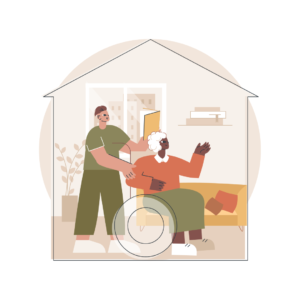Introduction: As our population ages, the importance of elderly care becomes increasingly apparent. Elderly individuals deserve to age with dignity, independence, and a high quality of life. In this blog, we will explore the significance of enhancing elderly care, focusing on strategies to improve their quality of life and promote independence.

Understanding the Importance of Elderly Care: Elderly care encompasses a range of services and support systems designed to meet the unique needs of aging individuals. From healthcare and assistance with daily activities to social engagement and emotional support, elderly care plays a vital role in ensuring that seniors can age comfortably and with dignity. By prioritizing elderly care, we honor the contributions of our older adults and uphold their right to live fulfilling and meaningful lives.
1. Comprehensive Healthcare Services: Access to quality healthcare is essential for maintaining the health and well-being of elderly individuals. Comprehensive healthcare services for seniors should include preventive care, management of chronic conditions, and specialized geriatric care. By addressing their medical needs promptly and effectively, we can enhance their quality of life and promote healthy aging.
2. Supportive Housing Options: Many elderly individuals prefer to age in place, remaining in their own homes for as long as possible. To support this preference, it’s essential to provide supportive housing options such as assisted living facilities, independent living communities, and home care services. These options offer varying levels of support tailored to the individual’s needs, allowing them to maintain their independence while receiving assistance as needed.
3. Social Engagement and Community Involvement: Social isolation is a common challenge among elderly individuals and can have significant negative impacts on their physical and mental health. Promoting social engagement and community involvement is essential for combating isolation and loneliness. Activities such as social gatherings, group outings, volunteer opportunities, and senior centers provide opportunities for seniors to connect with others, build relationships, and stay active and engaged in their communities.
4. Caregiver Support and Respite Services: Many elderly individuals rely on family members or caregivers for support with daily activities and healthcare needs. Caregiving can be rewarding but also physically and emotionally demanding. Providing caregiver support and respite services is essential for ensuring the well-being of both caregivers and their loved ones. Respite care offers temporary relief to caregivers, allowing them to recharge and take care of their own needs while ensuring that their loved ones receive the care they need.
5. Promoting Independence and Autonomy: Maintaining independence and autonomy is crucial for preserving the dignity and self-esteem of elderly individuals. Supportive services should focus on promoting independence whenever possible, empowering seniors to make their own decisions and maintain control over their lives. This may involve providing assistive devices, mobility aids, and adaptive technologies to help seniors remain active and independent for as long as possible.
Conclusion: Enhancing elderly care is essential for ensuring that our aging population can age with dignity, independence, and a high quality of life. By providing comprehensive healthcare services, supportive housing options, promoting social engagement, offering caregiver support, and promoting independence and autonomy, we can create a more inclusive and supportive society where elderly individuals are valued and respected. Let’s prioritize elderly care and ensure that every senior has the opportunity to live their golden years to the fullest.
